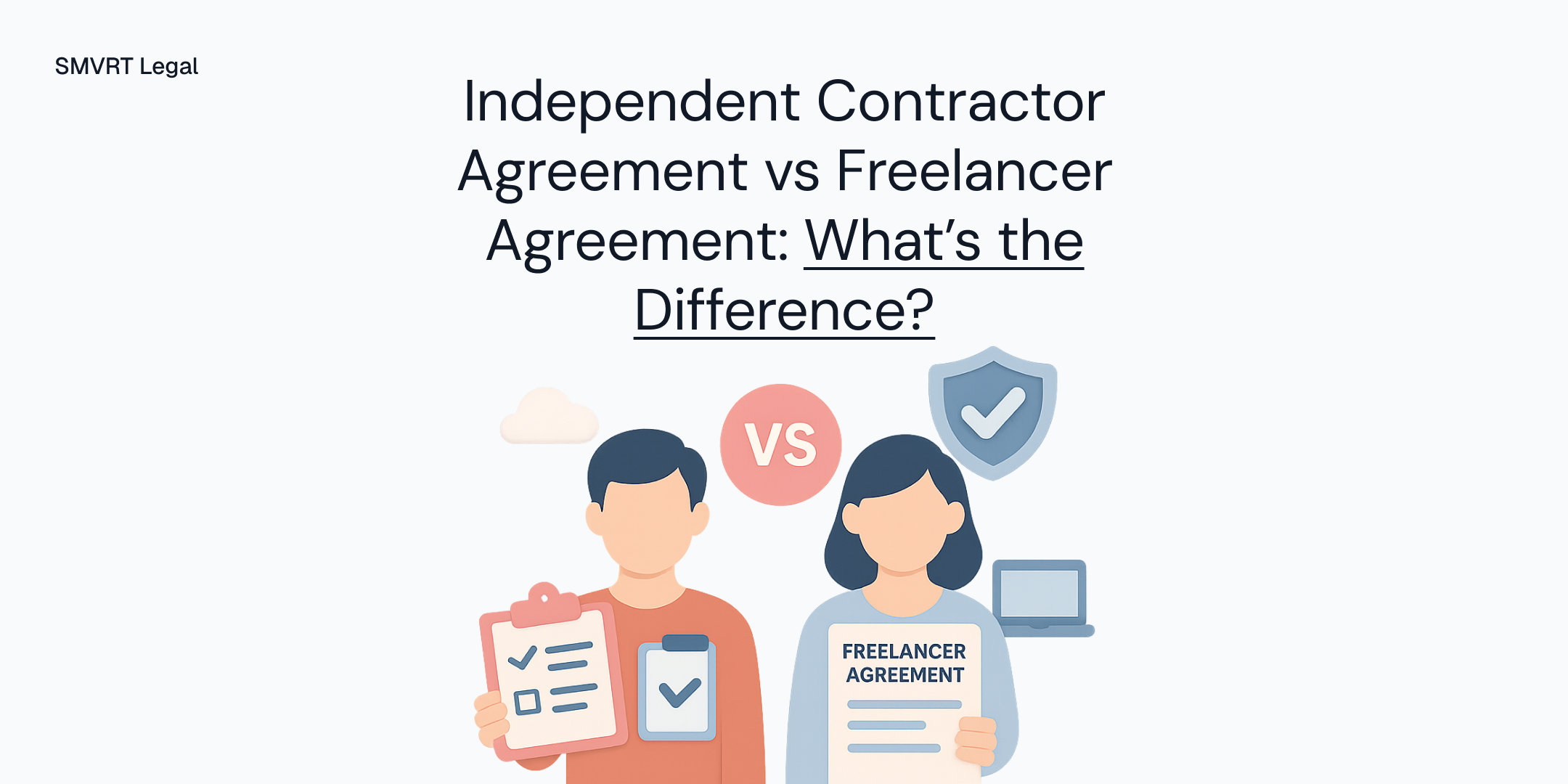5 Costly Mistakes in Master Service Agreements (and How to Avoid Them) Master Service Agreements...
5 Costly Mistakes in Master Service Agreements (and How to Avoid Them)
Master Service Agreements shouldn’t feel like legal traps. This version is written for humans first—so you can protect your work, move faster, and keep great clients.
Draft Your MSA Agreement the Smart Way
✅ Use SMVRT Legal’s lawyer-drafted templates and AI tools to build a custom Master Service Agreement in minutes.
Your first agreement is free when you sign up.
Time to read: ~9 minutes
Jump to: What an MSA Does · Mistake #1 · Mistake #2 · Mistake #3 · Mistake #4 · Mistake #5 · Modern Must-Haves · FAQs
What an MSA Actually Does (and Why It Fails)
Think of your MSA as the foundation of a house—poured once to set how you’ll work together: payment, IP, confidentiality, liability, and how you’ll handle disputes. Each Statement of Work (SOW) is a new room you add later. The SOW decides the specifics: what gets built, when it’s done, and what “done” really means.
MSAs fail when the SOW is vague or when the MSA is missing core protections underneath everything. The winning combo is simple: a clear MSA that governs and a specific SOW that defines the work.
Mistake #1: Your SOW Isn’t a Plan—It’s a Placeholder
The moment it goes wrong: You hired a developer for a “landing page.” You assumed mobile, speed, and GA4 were included. They deliver a desktop mock and call the rest “out of scope.” The invoice grows. The launch slips. Everyone’s annoyed.
A solid SOW is specific enough that a stranger could ship the project from it: deliverables, what’s not included, milestones, acceptance criteria, revision limits, and how changes are approved and billed. The MSA is your legal backbone; the SOW is your playbook for this job.
Fix it: Use a separate SOW for each project, expressly governed by the MSA. Define acceptance in writing and add a simple change-order rule so tweaks don’t spawn new contracts.
Optional: SOW checklist you can copy
SOW Snapshot Deliverables: 1 responsive landing page (desktop/tablet/mobile), 1 hero, 3 sections, contact form Performance: Lighthouse ≥ 85 mobile; image optimization; basic caching Integrations: GA4 pageview + form submission event Revisions: Up to 2 rounds (minor); major changes via Change Order Timeline: Draft by 10/20; final by 10/27 with 2 business days for review Acceptance: Written approval after UAT checklist Out of Scope: A/B tests, custom dashboards, copywriting Reference: “This SOW is issued under, and governed by, the MSA dated [Month Day, Year].”
Auto-check your SOW for gaps →
Mistake #2: Nobody Wrote Down Who Owns the Work
Fix it: Assign new work product to the client upon payment, and license any background tools the vendor brings (fonts, frameworks, code libraries) as embedded in the deliverable. That’s clarity for both sides.
Optional: Plain-IP clause (short form)
IP Ownership (Short Form) Work Product created specifically for Client under an SOW issued under this MSA is assigned to Client upon full payment. Provider retains all rights in its pre-existing materials, frameworks, tools, fonts, and code libraries; Provider grants Client a perpetual, worldwide, non-exclusive, royalty-free license to use such pre-existing materials solely as embedded in the Work Product.
Check your IP section in seconds →
Mistake #3: You Didn’t Decide Who Pays When Something Goes Wrong
Indemnification—who handles and pays third-party claims—doesn’t have to be scary. A fair default is mutual: each side covers problems they cause (IP infringement, gross negligence, willful misconduct) and both agree to a sensible cap on ordinary damages.
Optional: Indemnity + cap (short form)
Indemnity & Liability Cap (Short Form) Indemnity. Each party will indemnify, defend, and hold harmless the other from third-party claims arising from its (a) IP infringement; (b) gross negligence or willful misconduct; or (c) material breach of this MSA or an SOW. Limitation of Liability. Except for Confidentiality breaches, IP infringement, or amounts owed under indemnity, each party’s aggregate liability is limited to the fees paid or payable by Client under this MSA in the 12 months preceding the claim. No consequential or punitive damages.
Add a fair cap & indemnity now →
Mistake #4: There’s No Clean Exit
Agreements without clear exits turn into relationship traps. You don’t need drama—just rails: renewals, termination for convenience, and how to finish or wind down open SOWs (final invoices, asset handoff, data return).
Optional: Term & termination (short form)
Term & Termination (Short Form) Term. This MSA begins on the Effective Date and applies to all SOWs executed by the parties during the Term; it continues for 12 months, renewing month-to-month thereafter. Termination for Convenience. Either party may terminate with 30 days’ written notice. Effect of Termination. Parties will complete in-flight SOWs or mutually agree to wind-down; Client pays for work performed and approved expenses. Survival. Confidentiality, IP, indemnity, and payment obligations survive termination.
Generate clean exit language →
Mistake #5: Your Template Is Stuck in Yesterday
Older templates skip today’s realities: remote devices, cloud data, security attestations, and state-level quirks. Update your MSA every 2–3 years or when your business model changes.
Optional: Modernization pointers
Modernization Pointers Privacy & Security: If processing personal data, add a DPA; define breach notice (e.g., within 72 hours), data handling & deletion. Compliance: Reference SOC 2/ISO (if applicable); clarify subprocessors & equivalent protections. Remote Work: Access controls, MFA, BYOD, and offboarding procedures for accounts/keys. State Specifics: Choice of law & venue that make sense for both parties; make conspicuous limitations where required.
Refresh your MSA with modern terms →
The Modern MSA: What “Good” Looks Like
Your MSA should read like a calm set of rules. Your SOWs should feel like checklists that turn into results. When those click, margins improve and “quick calls” disappear.
Scope & Acceptance
Write acceptance like a recipe: what you deliver, how it’s reviewed, how long review takes, and what counts as acceptance. Deem acceptance if feedback doesn’t arrive on time, with a fair second pass to fix any miss against written criteria.
Optional: Acceptance language (short form)
Acceptance (Short Form) Client will review Deliverables against the SOW acceptance criteria within 5 business days of delivery. If Client does not reject with specific reasons within the review period, the Deliverable is deemed accepted. Provider will remediate any material nonconformity and resubmit for review within a reasonable time.
Order of Precedence
Make it obvious which document wins if they disagree: SOW for scope, pricing, milestones, acceptance; MSA for legal terms (IP, confidentiality, indemnity, limits, dispute resolution). If a legal term conflicts, the MSA prevails.
Optional: Order of precedence wording
Order of Precedence (Short Form) If there is a conflict: (i) the SOW controls project-specific scope, deliverables, milestones, pricing, and acceptance criteria; and (ii) the MSA controls all other terms, including IP ownership/licensing, confidentiality, indemnity, limitations of liability, and dispute resolution. If a direct conflict exists on a legal term, the MSA prevails.
Security & Data
If you touch personal data, include a DPA. Even if you don’t, a simple security schedule speeds vendor reviews.
Optional: Security schedule starter
Security Schedule (Starter) Controls: Access management, MFA, encryption in transit/at rest Incident Response: Notify within [72] hours of confirmed breach Subprocessors: Maintain list; ensure equivalent protections Data Return/Deletion: Upon termination or written request Audits: Provide SOC 2/ISO summary reports upon reasonable request
Try it now: Upload your MSA and one SOW. SMVRT Legal summarizes risks, flags missing terms, and suggests language for your side (client or vendor).
About the author: Tamara Armstrong is a corporate and contracts lawyer who helps startups and SMBs turn legal headaches into simple playbooks. Connect on LinkedIn.
FAQs About Common MSA Mistakes
What’s the simplest way to prevent scope creep?
Do I own the work I paid for?
What’s a fair liability cap?
Which wins: the MSA or the SOW?
When do I need a DPA?
Make your next MSA boring—in the best way. Clear scope, clean IP, fair risk, easy exits. Let our templates and AI checks handle the legal heavy lifting while you focus on the work.
This article is for educational purposes only and does not constitute legal advice.
Discover Smarter Legal Solutions
Build, review, and manage your business contracts with confidence. SMVRT Legal brings attorney-reviewed templates, compliance tools, and real legal guidance together in one platform.
Visit SMVRT Legal →

.png?height=200&name=Master%20Service%20Agreement%20vs%20Statement%20of%20Work%20(SOW%20vs%20MSA).png)

